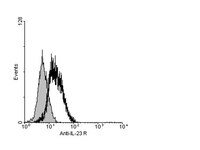Yeast ubiquitin-like genes are involved in duplication of the microtubule organizing center.
S Biggins,I Ivanovska,M D Rose
The Journal of cell biology
133
1996
Show Abstract
KAR1 is required for duplication of the Saccharomyces cerevisiae microtubule organizing center, the spindle pole body (SPB) (Rose, M.D., and G.R. Fink, 1987. Cell. 48:1047-1060). Suppressors of a kar1 allele defective for SPB duplication were isolated in two genes, CDC31 and DSK2 (Vallen, E.A., W.H., M. Winey, and M.D. Rose. 1994. Genetics. 137:407-422). To elucidate the role of DSK2 in SPB duplication, we cloned the gene and found it encodes a novel ubiquitin-like protein containing an NH2 terminus 36% identical to ubiquitin. The only other known yeast ubiquitin-like protein is encoded by the nucleotide excision repair gene RAD23 (Watkins, J.F.,P. Sung, L. Prakash, and S. Prakash. 1993. Mol. Cell. Bio. 13:7757-7765). Unlike ubiquitin, the NH2-terminal domain of Dsk2p is not cleaved from the protein, indicating that Dsk2p is not conjugated to other proteins. Although the DSK2-1 mutation alters a conserved residue in the Dsk2p ubiquitin-like domain, we detect no differences in Dsk2p or Cdc31p stability. Therefore, DSK2 does not act by interfering with ubiquitin-dependent protein degradation of these proteins. Although DSK2 is not essential, a strain deleted for both DSK2 and RAD23 is temperature sensitive for growth due to a block in SPB duplication. In addition, overexpression of DSK2 is toxic, and the DSK2-1 allele causes a block in SPB duplication. Therefore, DSK2 dosage is critical for SPB duplication. We determined that CDC31 gene function is downstream of DSK2 and KAR1. Dsk2p is a nuclear-enriched protein, and we propose that Dsk2p assists in Cdc31 assembly into the new SPB. Full Text Article | 8682868
 |










